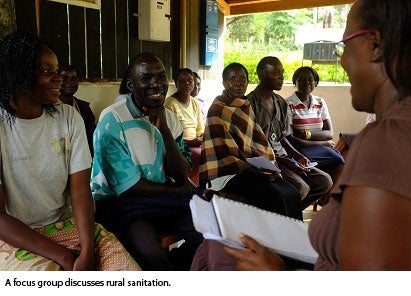If a year ago you told me that I would be able to speak authoritatively on the technical aspects of sanitation, I would have thought you were crazy! Kenya is my home; I am 130% Kenyan and have lived here my whole life. In all this time, I never fully realized the sanitation issues in my country. True, I knew the statistics but until recently I didn’t fully realize how the impact was hitting my home.
 I was born in and currently live in Nairobi, the capital of Kenya and the most populous city in East Africa. Nairobi is the cosmopolitan hub of East Africa and bustling with activity both day and night. While I have always lived in the city, I have family who live in Migori, a rural village, roughly 600km from Nairobi and bordering Tanzania. As a child my parents would take us to visit every five years or so. Each time I was struck by the inconvenience and indignity of having nothing to use but a sheltered, smelly hole in the ground instead of a toilet. It required squatting, trying to aim to get it right in the hole and having to stay outside before returning to the house as I waited for the stench to wear off. We even came up with a way of making the stench that “stuck” on us less strong. We would remove cardigans and other heavy clothing before we entered the latrine (talk about innovation!). But each time I returned home from one of those visits, I quickly forgot what it meant to not have access to a clean, convenient toilet.
I was born in and currently live in Nairobi, the capital of Kenya and the most populous city in East Africa. Nairobi is the cosmopolitan hub of East Africa and bustling with activity both day and night. While I have always lived in the city, I have family who live in Migori, a rural village, roughly 600km from Nairobi and bordering Tanzania. As a child my parents would take us to visit every five years or so. Each time I was struck by the inconvenience and indignity of having nothing to use but a sheltered, smelly hole in the ground instead of a toilet. It required squatting, trying to aim to get it right in the hole and having to stay outside before returning to the house as I waited for the stench to wear off. We even came up with a way of making the stench that “stuck” on us less strong. We would remove cardigans and other heavy clothing before we entered the latrine (talk about innovation!). But each time I returned home from one of those visits, I quickly forgot what it meant to not have access to a clean, convenient toilet.
Recently, my supervisor suggested I join a team visiting several communities in different parts of rural Kenya to carry out research on rural sanitation practices. The focus group I was working on was trying to better understand the needs and wants of the community in terms of latrines for purchase. The communities all have high rates of people practicing open defecation, which has serious health and economic implications.
When we asked about latrines, we heard about the need for it to be clean, odorless, long-lasting, and all-weather (some latrines collapse during rainy season). One overarching theme the women mentioned was how a latrine would allow them to feel safer. As these women and anyone working in the sector will tell you, one major issue about not having access to sanitation is safety, particularly the threat of rape for women. Another safety issue that a Masai woman in a village in Rift Valley raised was the threat from animals. She told a harrowing story of how when she went outside at night to defecate in the open she suddenly found herself face-to-face with a hyena. At that moment, of course, the need to go ceased but it also made her decide to build a latrine within her homestead and so she is now one of the few latrine owners in the area. For men, there are also gender-specific implications of not having a latrine. They reported that not being able to provide a toilet for the family means losing respect among peers.
In Nyanza Karachuonyo, a rural area 400km from Nairobi, the villagers are defecating in Lake Victoria, which is the very same lake that the fish they eat are from, and the water they use for domestic purposes is from. Open defecation is a practice they have always known so I also learned that this isn’t just about providing a latrine. It’s about understanding current practices to better learn how to change behaviors.
So while I still remember when a toilet was just a toilet to me, it’s now so much more. I will no longer visit my family in Migori and take for granted the importance and convenience of having a toilet. Now, I find myself looking at latrine slabs, super structure, shape and smell – and not just looking, but taking photos!


Join the Conversation